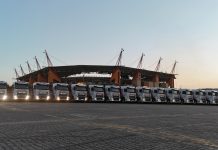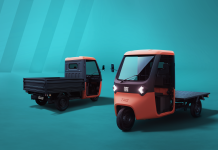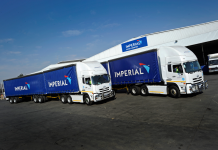Transportation engineering runs through Lindiwe Mupona’s veins like the complex networks she works on to ensure South Africans get from one place to the next in the safest and most efficient way possible.
From an early age, Mupona was fascinated by the complexities of urban development and transport infrastructure. This initial spark of interest guided her academic path, leading her to earn an Honours Degree in Town Planning. However, her thirst for deeper knowledge and impact in transportation led her to pursue a Master’s degree in Transportation Studies at the University of Cape Town, graduating in 2004.
Her first job was as a junior transportation planner for a consortium working on the preparation of a Public Transport Plan and Rationalisation Plan for the City of Cape Town. “That was where I first found out about the black-owned multi-disciplinary engineering and architectural firm, GIBB, which was also part of the consortium working on the project. At that time, I was planning to move to Gauteng with my family. When I found out that GIBB had offices in Gauteng, I applied to join its Pretoria office and joined the business in 2005.”
Today, she is involved in transportation planning, traffic engineering and transportation modelling projects, working for GIBB’s transportation division, which offers a range of services to both public and private clients, including transportation planning, engineering and policy, transport economics, logistics and operations, Public Private Partnership (PPP) solutions, and asset management services.
Mupona’s journey wasn’t without its challenges. Despite her skills and dedication, she faced the hurdle of not being able to sign off on key project reports until she achieved formal engineering accreditation. This challenge spurred her to further her qualifications.
“That’s why, in 2010, I enrolled for a Diploma in Civil Engineering and then a BTech in Civil Engineering, specialising in Transport Engineering. After completing these studies, I was able to register as a professional Engineering Technologist in 2019,” she explains.
Mupona says she loves the challenge of finding ways to provide efficient, safe and sustainable transportation systems that positively impact communities. “Traffic engineering is about making cities and communities more liveable. It requires a deep understanding of human behaviour and urban planning and allows me to apply the knowledge and skills I gained while studying for my first degree in town planning.
“One of the most rewarding aspects of working as a traffic engineer is seeing the tangible results of my work, for example, when a well-designed transportation system is implemented. Whether it’s working on simple projects such as a new taxi rank or working on large, complex ventures such as the Gautrain or Bus Rapid Transport (BRT) system, you know you have made a difference in peoples’ daily lives,” she adds.
Some of the work Mupona is proudest of includes conducting a feasibility study for the proposed Cape Town Airport to CBD Rail Link; her work on the Gautrain modelling; being the lead transportation modeller for the development of the existing Saturn model for the City of Johannesburg Inner City Transport Master Plan; and working as the lead on various other Traffic Impact Studies and Assessments, as well as her work on several transportation plans, the development of the Gauteng Visum Transport Model for the Gauteng Transport Master Plan; and the design of Traffic Signals.
She says trying to balance work and her role as a mother has not been easy. “Engineering is a demanding field and I’ve had to learn to let go of “mom guilt”. I have accepted that as a working mom I have to rely on my support system to balance my work and personal life. I employ a full time helper and tutor for my children and being able to work from home has also helped me gain better balance in my life.”
She advises other women considering a career in engineering to set boundaries and make time for themselves and their loved ones.
“While engineering can be tough and women may encounter obstacles such as gender bias or the underestimation of their abilities, it’s how they overcome these challenges that makes them stronger. Here, resilience and a mind-set of continuous learning and problem-solving are key,” she concludes.
Home Industry Players Transportation Engineering: The Science & Art of Designing Seamless Mobility Solutions















